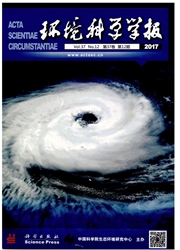

 中文摘要:
中文摘要:
目的研究脐血浆中硫化氢(H2S)和羊水污染的相关性。方法收集孕产妇脐血浆60份,根据分娩时羊水是否污染分为2组。用敏感硫电极检测脐血浆中硫离子的浓度,并换算出H2S的含量;免疫组织化学方法检测胎盘中胱硫醚-γ-裂解酶(CSE)和胱硫醚-β-合成酶(CBS)的表达程度。结果羊水污染组中H2S含量高于羊水清组,差异有显著性。免疫组化显示:CSE表达于胎盘绒毛的细胞滋养层胞浆中,羊水污染组CSE呈现高表达。CBS在任何组中均未见有表达。结论胎盘绒毛的细胞滋养层胞浆中含有CSE,不含CBS;脐血浆中H2S由细胞滋养层细胞参与调控生成;孕产妇脐血浆中H2S与羊水污染有密切关系。
 英文摘要:
英文摘要:
Objective To explore the relationship between endogenous hydrogen sulfide( H2S) and meconium-stained amniotic fluid( MSAF). Methods The sixty cord plasma samples were collected and divided into two groups according to amniotic fluid stained. The concentration of H2S was assayed by sensitive sulphur electrode. The expressions of cystathionine beta-synthase( CBS) and cystathionine gam- ma-lyase(CSE) in placenta were measured with imnmnohistochemistry was used. Results H2S contents with MSAF were higher than that with normal amniotic fluid( P 〈 0.05 ). The expressions of CSE were detected in cytoplasm of placental villi trophoblast cell and at higher lev- els in the group with MSAF. There were no differenee among those groups about the expressions of CBS. Conclusion CSE,neither CBS,is in cytoplasm of placental villi trophoblast cells. The production of H2S in cord plasma is regulated by trophoblast cells. H2S eontent in eord pla- centa is related to MSAF.
 同期刊论文项目
同期刊论文项目
 同项目期刊论文
同项目期刊论文
 期刊信息
期刊信息
